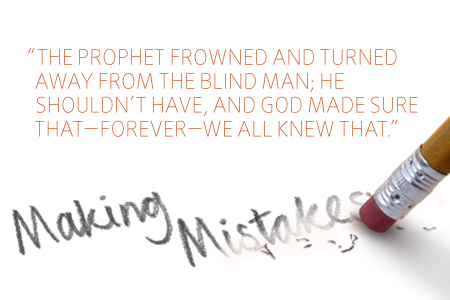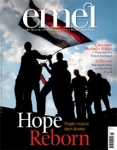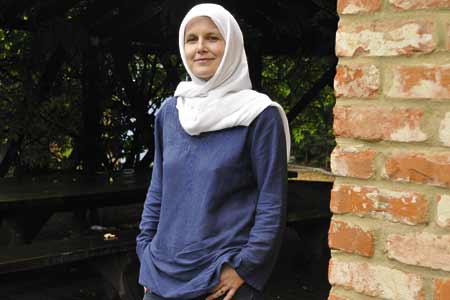
Lucy Bushill-Matthews - Making Mistakes
Issue 78 March 2011
We are all prone to making mistakes: small ones, big ones; frequently, rarely; different ones, same ones. Yet God is Merciful, and so should we be.
Michael Jordan, the greatest basketball player of his time said, “I have missed more than 9,000 shots in my career. I have lost almost 300 games. On 26 occasions, I have been entrusted to take the game-winning shot, and I missed. I have failed over and over and over again in my life. And that is why I succeed.”
In fact, the lessons learned from mistakes often provide a more lasting and powerful impact than those learned from doing things right. It was Winston Churchill who said, “All men make mistakes, but only wise men learn from their mistakes.” Presumably, women are included within that too.
Some mistakes are made out of ignorance. When a Bedouin came to a mosque in Madinah and began urinating in it, the Companions wanted to attack him for such conduct. Instead, Prophet Muhammad dealt with the incident with care and understanding, patiently explaining to the Bedouin the purpose of a mosque and then asked someone clean the affected area (Muslim). Today, mosque worshippers are often quick to correct forcefully what they see as the ritual errors of those new to Islam. “Brother, stand closer to the person next to you. Satan will otherwise come in between you,” or “Sister, you are praying with nail varnish on; take it off, and wash properly before doing that prayer again.” It is indeed important to help others learn, but we have been shown we must do this with gentleness and understanding.
Other mistakes we make relate to things we know we should not do, for example, lying or gossiping about another person. We can learn from Abu Bakr, an exemplary Companion of the Prophet, who once said something that may have hurt another of his Companion’s feelings. Abu Bakr immediately understood his own mistake, and ordered his friend, “Say it back to me.” The other person refused. When Abu Bakr went to Muhammad for advice, the Prophet checked the story, and advised the Companion, “Rather say, ‘May God forgive you, O Abu Bakr’.” As Abu Bakr walked away after receiving his admonition, he cried. You can imagine he never did this again.
Of course, there are some mistakes we make over and over again. It takes effort to adhere daily to the key rituals of Islam both correctly and on time; to be consistently kind and sincere; to remain humble in all circumstances; to treat all people equally, regardless of their status, race, or nationality; to be generous with what we have; and to genuinely want for others what we want for ourselves.
Yet, it is never too late to aspire to change. The blessed Prophet said, “Every son of Adam makes mistakes, and the best of those who make mistakes are those who repent.” (Tirmidhi)
Mistakes made by some of the twenty-five Prophets mentioned in the Qur’an were pointed out publicly by God so that we can all learn from them. Adam’s error of judgement is well-documented. “Then they both ate of the tree, and so their private parts appeared to them, and they began to put on themselves leaves from Paradise for their covering. Thus did Adam disobey his Lord, so he went astray.” (20:121). The Muslim understanding is that Adam and Eve subsequently repented for their actions, and God accepted their sincere repentance. In this context, there is no need for a perpetual feeling of guilt—or for perpetual punishment. Mistakes can be forgiven.
David is known for his vanquishing of Goliath, his melodious Psalms (Zabuor), and his sound wisdom as a judge. Yet, he too was not free from erring. When two brothers came up to him, one with one ewe, the other with ninety-nine, he heard the first one complaining that the other even wanted his single ewe (38:22-24). David made an impetuous decision about who was right, without even hearing from the opposing party. He subsequently realised that his God-given gifts of wisdom and justice were not there to be abused in any way. So, despite (or perhaps because of) his position as King, he asked forgiveness from God for any self-pride and haste; and he was indeed forgiven.
Jonah made the mistake of giving up: he was angry that the people of Nineveh would not listen to his call to worship One God, and so abandoned them. We know he boarded a boat; was thrown overboard by his co-sailors in an attempt to calm the storm, was swallowed by a gigantic fish and finally, when he was in the darkness of the fish and the darkness of the night, Jonah called out in distress to God and asked for forgiveness, (37: 139–144). God heard, and God forgave: He gave Jonah another chance.
Even the blessed Prophet Muhammad was reprimanded by God in the surah entitled ‘He Frowned’. He was intently engaged in conveying the message of Islam to several of the important leaders of the Makkan tribe of Quraysh, when a blind man named `Abdallah Ibn Umm Makhtum repeatedly interrupted him to seek spiritual guidance. Muhammad became a little irritated at the interruptions and turned away from the blind man to continue talking to the leaders of Quraysh. God then publicly reproached His Prophet for his misjudged priorities through direct revelation of Qur’anic verses (80:3–11).The blind man wasn’t even able to see the frown, yet Muhammad was still reprimanded.
We continue to make those very same mistakes today: not following guidance given by those who are looking out for our best interests; being quick to judge a situation; giving up easily; and treating people differently. And I see my children also making those same mistakes. One rushes to switch the TV on when I step out of the house despite being well-aware of the ‘house rules’; one is convinced that they are right in any dispute with their siblings; one thinks they will never get to grips with Qur’an memorisation or maths percentages and so might as well not try; and on an outing to an orphanage, one of my children initially preferred to be with her existing school-friends rather than make friends with the orphans who are of another culture and another background, yet who are so desperate to befriend her.
Stephen Covey, author of The Seven Habits of Highly Effective People recommends, “When you make a mistake, admit it, correct it, and learn from it – immediately.” It is good advice, but omits the need to also ask for forgiveness. For God said, “O son of Adam, so long as you call upon Me and ask of Me, I shall forgive you for what you have done, and I shall not mind. O son of Adam, were your sins to reach the clouds of the sky and were you then to ask forgiveness of Me, I would forgive you. O son of Adam, were you to come to Me with sins nearly as great as the earth and were you then to face Me, ascribing no partner to Me, I would bring you forgiveness nearly as great as it.” (Tirmidhi)
I only wish that we would become a little more forgiving of each other.
Lucy Bushill-Matthews is author of ‘Welcome to Islam—a convert’s tale’. You can read more of her work in emel here.
Bookmark this |
|
Add to DIGG |
|
Add to del.icio.us |
|
Stumble this |
|
Share on Facebook |
|
Share this |
|
Send to a Friend |
|
Link to this |
|
Printer Friendly |
|
Print in plain text |
|



Comments
3 Comments
1
BritWales
27 Oct 11, 15:06
Making Mistakes. . . .
Lucy Bushill-Mathews reflects. . . . "He gave Jonah
another chance."
With utmost respect to the writer and Editor of
Emel, it is surely preferable to use the word
'opportunity' instead of 'chance' as that is a term
included with others in text which are related with
matters of "shirk", such as luck, magic, etc.
2
shakkeer Abdurahiman
17 Mar 11, 13:29
go ahead with poster
3
Rebecca Masterton
8 Mar 11, 16:47
The alleged tafsir stating that it was the Holy Prophet
(s) who frowned at the blind man is INCORRECT. This
tafsir was concocted to denigrate the status of the Holy
Prophet (s). It actually refers to a group of Quraysh
who were present with the Holy Prophet (s).